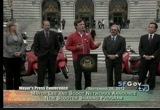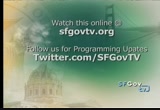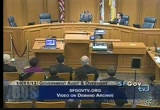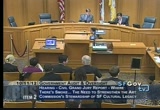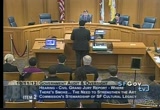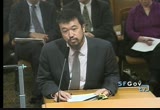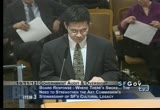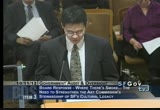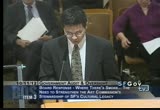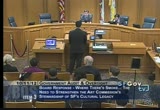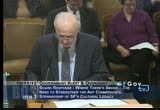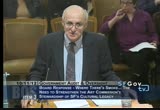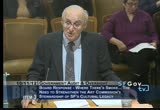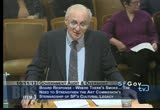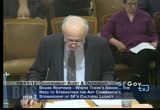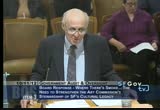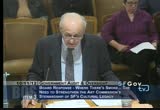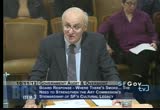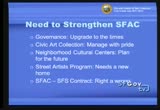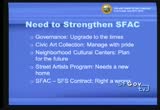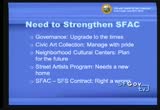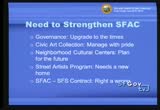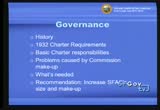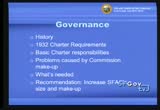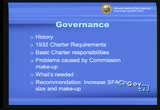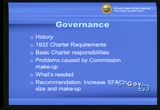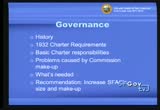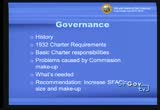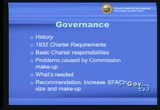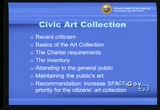tv [untitled] October 14, 2012 2:00pm-2:30pm PDT
2:00 pm
economy where every minute counts, they don't want to be waiting around for someone to pick them up and circling for parking, they want an option that's faster and more affordable and more convenient and graenbacker greener and as we can see, our city's leadership feels the same way. we are today opening the world's first network of shared electric scooters that you can activate with your smart phone and your phone, it's not just a key to the scooters, it's really a key to the city, it brings everything in the city closer to you, it opens up new neighborhoods that you may not have gone to before and it makes the places you get to every day more fun to get to. for those of us who ride, life before scoot is sort of like life before mobile phones, once you have a short-cut to anywhere in the city in your
2:01 pm
2:02 pm
>> and go giants. congratulations to them and to all of those of you wearing orange and black in the chambers. i want to thank the members of sfgov tv who are working on this committee meeting. and the clerk, ms. alisa miller. i am joined by board president david chiu and we will be joined by committee vice chair sean elsbernd. do we have any communications? >> please make sure silence all cell phones and electronic diveess, any document documentse submitted to the clerk. >> supervisor chiu: i just want to thank the patience and indulgence of the chair as well as members of the public. we were not watching the celebration of the giants. there was a signing ceremony
2:03 pm
today for our u. s. transportation secretary announcing a grant to the subway project planned a few weeks ago and we had some miscues but we're ready to go. >> president farrell: clarification, i was watching the giants. madam clerk, please call items 2 and 3 together. >> item 2 is a hearing and item 3 is a resolution. >> president farrell: thank you very much. and from the mayor's office, if you want to come forward. >> hello. my name is leo chee, budget officer with the mayor. thank you for having this hearing and thanks to the service for the grand jury for your report on the arts commission. on behalf of the mayor's office, i really want to acknowledge
2:04 pm
that the arts commission has had challenges in the past as we've seen in the controller's audit in the past, but i also want to say that i'm very excited that under the leadership of the new director of cultural affairs, tom -- i think we have made a lot of progress at the arts commission moving forward on the better systems, and management that we want to see at the arts commission. so i do really want to recognize that in theort there is a number of findings and recommendations, and i'm excited that the department has begun making progress on a large number of them. in terms of the mayor's office response, our response is due on october 24, like the board we have some additional days but i do have prepared the draft for the mayor's office. so if you do have questions, i'm happy to answer what i expect that the mayor's office will have as responses to our findings and recommendations
2:05 pm
that require our response. with that, i just want to also recognize that there are significant number of departments here. i believe there are about 10 didn't. i don't know if they've been able to stay, but they're also here and available to -- in addition -- in responses that you have in your file they're available to answer questions. so i'm going to go ahead and hand this off to tom biew canny from the arts commission who will give you -- the mayor's office responses are similar to the arts commission responses. we agree on most of the items that -- we have the same responses in most cases. >> do you have any questions? can i ask for the civil grand jury i want to give they will opportunity to present first, if that makes sense. if there's a member of the civil
2:06 pm
grand jury, i should have done that to begin with. >> actually, that's very helpful. we appreciate the mayor's office for providing a short and sweet response. just wanted, for the record, to indicate me name is mario choy, the foreperson pro tem of the 2011-12 civil grand jury. hank you for hearing this report where there's smoke there's need to strengthen the -- of san francisco's cultural legacy. before i turn the podium over to my colleagues who will present the report about governance issues, and whatnot, i wanted to clear up some misunderstandings about the comp position and work of the civil grand jury, some of which came out during the last meeting of the government audit and oversight committees. i know the supervisors here probably know how the jury works
2:07 pm
and what it encompasses so i ask for your indulgence given the fact that those who are watching do not. the california constitution state law requires a grand jury to serve from july 1 to july 30 of the following year. in san francisco the presiding judge of the superior court empanels two grand jury, one that's the indictment grand jury and we the civil grand jury report on matters of concern. the citizen watchdog of county government, the civil authority has authority to investigate and viewt niez the conduct of business of county government as well as the operations of various offices and agencies. the 19 of us, all citizens of san francisco, determine which officers, departments, and agencies the jury will investigate during its one year
2:08 pm
term of office. so during this year, we were required to make at least one report of our findings and recommendations for improvement. during these investigations jury has authority to inspect and audit the books and subpoena if required civil servants who have pertinent information. during the course of the year it's not unheard of for a grand jury to put in over 500 hours of his or her time into the work of the grand jury. so in order for a report to become public, a minimum of 12 members of the 19 member grand jury must approve to publish the report. the report is reviewed by the presiding judge of the superior court before dissemination. departments have 60 days to respond while the board of supervisors has 90 and the reason why we're here today. so with that i am going to turn
2:09 pm
the modeium over to moreton rafael the chair of the investigating committee that drafted and published this report and he will be assisted by members of the investigative committee including mark, allegra, and jean. >> president farrell: i want to thank you for your hard work and for ever member of the civil grand jury we know how much time and effort you spend on what you do. it's contractuall critically imr city. thank you on behalf of the board of supervisors and everyone in san francisco. thank you for your hard work. >> thank you. >> chairman farrell, president chiu, my name is mort rafael, and i serve as the chair of the committee that actually did the leg work to bring together the information that we will present
2:10 pm
today. i must confess, however, that due to the reason that perhaps supervisor farrell was late, i too was watching the ballgame, and an awful lot of energy has been expended on certain plays that happened that were absolutely draining. so please forgive me if my brain does not function as clearly as it should. but i'll try to at least present some of the highlights of our report, that will provide you with at least our view of what's going on. and i was particularly struck with the comment that the representative of the mayor made that progress is indeed being made in the transformation of the civil -- san francisco arts commission. we too recognize that there has
2:11 pm
been changes but indeed we find those changes at the moment to be very insufficient and we will characterize why as part of our report. and i was cheering a lot so if you pardon me, i'll just... at the outset, i think it's important to at least acknowledge that arts in san francisco play a very significant role in the way in which the community responds to the way -- to the activities of being a citizen here. i must say that we have spent more money than almost any city, on a per cap ta basis, we have calculated we are most per capita spend city in the united states. that's point one which will reflect the fact we are a community supporting arts. we have introduced, as the first
2:12 pm
city in the united states, neighborhood cultural centers, as a reflection of not only dealing with art, but making sure that art is focused in the neighborhoods. we really want our community to have the opportunity to participate, to deal with, and actually to become involved with art development. recently the city has found its way to make sure that at least 2% of every new construction in city buildings is preserved for art. and this is kind of an extraordinary thing for a city of our size to do. as a result, we have a wide array of lots of cultural and artistic venues for people to take advantage of. >> i wanted to let sfgtv, we have a powerpoint. >> yes, we do. but i'm not quite ready to use it yet but i will hit that button in just a moment.
2:13 pm
thank you for reminding me. the reputation and promise of the arts commission has been tarnished recently. and i think by looking at our report and reading it, you get a clear indication of how what was to be an extraordinary part of our art community has found itself faced with a variety of challenges and criticism. and as such, those criticisms and negative responses need to be addressed by the community. and the civil grand jury has a particular point of view, and that is a citizen's point of view. we have no axe to grind. we don't represent any government agency that is in the city. we're not representing people who are providing the services of art in the city. we just are looking at this as citizens. and as such, we have gone to the
2:14 pm
extent of reviewing all of the criticisms that have been made, and we spent a year learning and evaluating, and actually preparing recommendations that the rest of our committee has agreed to adopt. we are under the supervision of the superior court, and as such, we find that we take this responsibility very seriously. it's important to point out, as was hinted, and mario's introduction of the grand jury that no single juror can go out and have an interview with anybody that is part of an investigation. there have to be at least two of us, so that we can bring together an honest, clear, verified record of a conversation. we also must triangulate our
2:15 pm
findings so that at least two sources have been made known to us, that say what our findings are. and that we will go to the trouble of verifying each of these findings with the people who provided the information. so we reinterview an awful lot of folks who provided this information. i'm not going to repeat all of the various criticisms that have come before you in the -- our report concerning the arts commission. but i think it's important for you to sort of learn by yourself, by looking at our report as to who they are. it's a fairly broad section. some of it comes from the public in the form of newspaper articles, some of it comes in the form of government audits and sunshine task force. and it's important that you appreciate the fact that these bodies have found faults with
2:16 pm
the art commission's performance that have not been approached to change dramatically by the arts commission itself for the future. and i say this because the commission itself is governed in a way that i will speak to in more detail later. but it's governed in a way that sometimes does not account for public interest as much as it accounts for the interest of the arts community. and i think that that's a major issue that needs to be address addressed. we interviewed more than 30 people, some of them several times, to clarify and verify what we learned. the interviews covered the gamut. we talked to members of the arts commission, both past and present. we talked to members of the staff. we talked to a number of city department leaders, and their staff. we talked to a number of grantees of the arts commission, street artists, a nonprofit
2:17 pm
executives, journalists, we reviewed the city charter, the police code, ordinances, the commission's bylaws, their minutes, budgets, website, publications, orientation package for new commissioners, artists, sunshine materials, just to give you an idea that we really took this thing very seriously, and went to a lot of effort to sort of gain a clear understanding of what the arts commission's situation is about. in recent times, the president of the arts commission resigned, and was replaced by the mayor. the director of cultural affairs resigned and was replaced. the deputy director position was reinstated and was refilled. two other commissioners were replaced by the mayor. and that's a lot of smoke. and so therefore we undertook our investigation.
2:18 pm
and now i'm going to turn to my powerpoint projection, if i can figure out how... thank you. the most important preliminary issue to be addressed is the governance of the arts commission. as you appreciate -- i think each of you have had lots of experience with organizational structure and behavior. but i think you understand that organizations tend to follow its leadership. and even though there may be a strong expecter, the governing body presents a lot of overview for the executive to follow. and the body that is made up of the arts commission really sets its tone, sets its direction, and sets the way in which the staff carries out its responsibilities.
2:19 pm
the arts commission was born in the 1932 charter. and i must admit, so was i. so i can -- i was just sort of acknowledging the fact that the arts commission charter and i were born in the same year. it doesn't give me any insight into fact, but it gives me an awful lot of insight into the changes taking place since those 830 years. >> president farrell: i would say you look better than the arts commission, according to you guys. >> thank you, sir. the 32 charter requires that the commission itself is made up of 15 people. and it does have an ex-officio member from the planning commission which is acknowledged. but 11 of those 15 members must be practicing professional artists, four members are at large. now, acknowledgin acknowledgingt
2:20 pm
15 art professionals was required speaks to the fact at the time when there was no arts commission and a time where there was very little organization in that regard, and probably very important to have professional artists help to characterize, organize, set policy for this program. and, today, we believe that's still true, that it's important to have professional artist overseeing the development of the programs, o that the arts commission plays and providing leadership to that community. but we really believe, based upon our experience in watching the problems the arts commission has faced and the way it deals with those problems that it is insufficient to really manage the the arts community in 80 years later. lots of things have changed, and
2:21 pm
lots of art design program goes along with that, and lots of needs of the arts commission left abated because of the makeup of the arts commission, due to the 32 charter. basically, the duties of the arts commission are pretty self-evident. there's providing the leadership that is necessary for the arts commission to carry out its assignments. they encourage art awareness in the community. they encourage community participation. and they encourage the expression of art. they help local art groups. and they help with government funding. that's a source i'd like to get back to later because i think it's a self-diluted position that they cannot try to find
2:22 pm
funding for their needs outside of government sources. the library does it, rec and park does it. it's an issue that is done very successfully by other organizations in government and it's something that i think holds back the growth and development of the programs in the community, and something that really needs to be attended to. more about that later. specifically, they have -- the arts commission have some very important rules and responsibilities. amongst them are approving the design of all public buildings, approving the purchase or acceptance of all new city art, accepting the responsibility for maintaining and keeping an inventory of all of the art that the city owns, and promoting neighborhood arts in the various communities. and i'm sure the board of
2:23 pm
supervisors is somewhat familiar with the arts commission, since it apropose operates funds for the arts commission to function. our report found significant problems with the arts commission meeting its charter responsibilities. as i said, the 1932 charter probably worked well in terms of the makeup of the arts commission. it doesn't do so now. we talked a little bit about the changes that have taken place over the last 80 years, and i think the board of supervisors should also take a moment to reflect on the significant changes that have happened even during your terms of office which make you think twice about how you respond to problems. community priorities change over
2:24 pm
time. the arts commission needs to be particularly sensitive to the public and its needs. and what we find is, the way the arts commission carries out its role and responsibilities, it focuses on the arts organizations that deal with the programs, and we believe, at the expense of dealing with community priorities and interest, and it needs to have amongst its members a larger group to participate, in understanding and carrying out its role with the community, with the people that are actually paying for this, with the people that are actually set the arts commission into being. and we think that that's an issue that needs to be addressed more aggressively by the commission. the commission needs to ensure that best practices are employed in terms of its management. and indeed, a lot of the problems that have been described by the audit reports
2:25 pm
of the controller speak to that, and indeed the the commission is trying to take some steps in that direction. but over time, the commission has allowed these reports and these criticisms to continue because the same problems occur again and again and again. and it is not the fault, necessarily, of the person who held that responsibility as the director of cultural arts in the past. although one can claim rather honestly that he made a lot of mistakes. but indeed those mistakes were not taken care of by the arts commission, over time. and so they were allowed to continue. a strong administrator is very helpful. a strong board is prime. that's a point i think that needs to be understood. so in effect, we think that not
2:26 pm
only clearer priorities to serve the public need to be addressed, but they need to develop ways to find funding for the programs that they -- and for the management of their organization, that is now very underbudget, even from our perspective. we think that they are understaffed. we think they're underbudget. but we don't believe they're doing much to attend to that. and it's because they don't have the kind of guidance and attention that a stronger, more broadly based governing body can provide them. and it doesn't take much to make that happen we believe, and we'll talk more about that in a minute. we do believe that more community leaders are necessary in the commission to raise its stature in the community and if it does that it will find that raising funds from outside of the government will be more
2:27 pm
available, that getting support from outside of the government will be more readily available, and its interesting to note that these comments are reenforced by other -- by some of the people -- well, they will be reenforced by a past commissioner who serves with great esteem in the cultural arts affairs, and i hope you have an opportunity to read that as part of the responses. i'm not allowed to mention names, otherwise i would. so in summary for this portion, or this particular focus on governance, we believe that the work of the arts commission is too important to remain static, that it is living under a charter requirement that limits its potential to be a much more
2:28 pm
significant organization in the city, and we recommend wholeheartedly that that change. one way or the other. we recommend that a charter amendment be made. if that cannot -- to expand the board and to bring in a broader scope but in the interim or instead of, an advisory committee can be established, sphreppedz of can be established. there are a variety of ways that the city can attend to this, and i don't think it should be left alone, and should be addressed rather quickly, to make the arts commission a stronger organization, in the community. the problem that was most prominent in the beginning of
2:29 pm
our term as members of the grand jury dealt with the civic art collection. and just to put it in perspective as to what it is, in a brief summary, it's considered to be a $90 million collection. it's supposed to have about 4,000 objects in it. however, its inventory has been stalled, and the maintenance of the objects in the collection have not been maintained properly. the charter is clear. the san francisco arts commission is responsible to maintain an inventory of all artwork owned by the city. now this inventory has been in the works for quite a number of years. when we first started in september 2011, we
92 Views
IN COLLECTIONS
SFGTV: San Francisco Government Television Television Archive
Television Archive  Television Archive News Search Service
Television Archive News Search Service 
Uploaded by TV Archive on

 Live Music Archive
Live Music Archive Librivox Free Audio
Librivox Free Audio Metropolitan Museum
Metropolitan Museum Cleveland Museum of Art
Cleveland Museum of Art Internet Arcade
Internet Arcade Console Living Room
Console Living Room Books to Borrow
Books to Borrow Open Library
Open Library TV News
TV News Understanding 9/11
Understanding 9/11